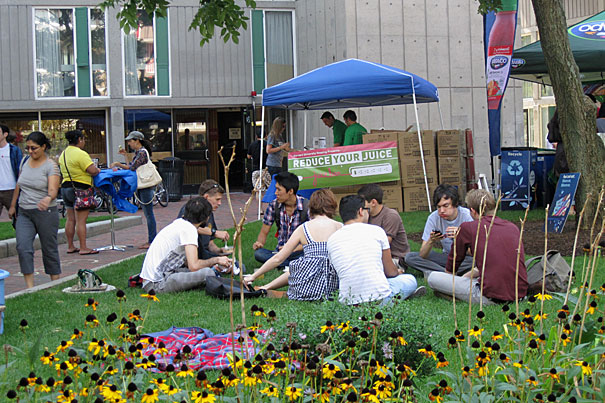
Three “Reduce Your Juice” events at Harvard University Housing properties educated residents about strategies for reducing energy, provided discounted energy-saving gadgets, and provided an opportunity to meet neighbors. The event was one in a series of activities across Harvard’s campuses that have sought to increase student awareness of sustainability and provide them with tools to help the University reduce its environmental footprint.
Colin Durrant/Harvard Staff
The sharing of the green
Orientation programs encourage Harvard students to live sustainably
The start of the school year can be a whirlwind for freshmen and returning students alike. The truth is, for most students, energy and the environment are two issues that take a back seat to choosing classes and furnishing their rooms. Over the past two weeks, a series of activities across Harvard’s campuses have sought to increase student awareness of sustainability and provide them with tools to help the University reduce its environmental footprint.
For the first time, Harvard collaborated with Philips and NStar to dramatically reduce energy use in dorms and graduate housing by distributing thousands of energy-efficient LED light bulbs to students. The bulbs, which were also provided to Harvard employees and affiliates at a highly discounted price, use 80 percent less energy than conventional bulbs and can last up to 20 years.
As in past years, incoming freshmen were immediately introduced to sustainability as a core Harvard value through a series of events organized by the Faculty of Arts and Sciences (FAS) Green Program and Office for Sustainability. Information tables, recycling quizzes, and a “Green Tour of the Yard” during opening days introduced the University’s sustainability initiatives.
The first “Brain Break” of the year on the evening of Sept. 5 featured an environmentally themed fair. More than 1,200 freshmen attended it in Annenberg Hall, where they received reusable mugs and pledged that they would use them to reduce waste. The freshmen then chatted over ice cream with representatives of environmental student groups, concentrations, and University offices involved in sustainability. Many students joined Green’16, which was created so the freshmen of that class year could mine creative, environmentally helpful ideas.
Harvard University Housing welcomed graduate student residents with a new sustainability video and tote bags that included green cleaning products from an alumnus at Seventh Generation, LED bulbs, and sustainable food and transportation resources. The reusable tote bags are designed to easily transport items to recycling bins. Three “Reduce Your Juice” events at Harvard University Housing properties educated residents about strategies for reducing energy, provided discounted energy-saving gadgets, and provided an opportunity to meet neighbors.
At Harvard Divinity School, students and staff collaborated to create a sustainability orientation video that is shown as part of a special sustainability section during student orientation. More than 600 reusable mugs were handed out to all first-year Harvard Law School (HLS) students, and free coffee was provided to those who brought their own mugs. Harvard School of Public Health students also received reusable mugs, and, for the first time, materials at the HLS activities fair were provided on a thumb drive to reduce waste. Sustainability resources were distributed at orientation events at the Graduate School of Design, the Harvard Divinity School, the Graduate School of Education, the Harvard Medical School, the Harvard School of Dental Medicine, and the Harvard Kennedy School.
The Student Sustainability Grant program organized by the Office for Sustainability is now accepting applications to fund innovative ideas and projects created by undergraduate and graduate students that help Harvard to build a more efficient, sustainable campus and meet its goal of reducing greenhouse gas emissions 30 percent by 2016, including growth.
The green orientation activities will be capped off on Sept. 18in Sanders Theatre with Harvard Thinks Green 2, featuring six professors from across the University presenting six big sustainable ideas for 10 minutes each. The event, styled after the popular “Harvard Thinks Big” series, will highlight innovative faculty research and aims to inspire continued involvement in sustainability initiatives across campus.




